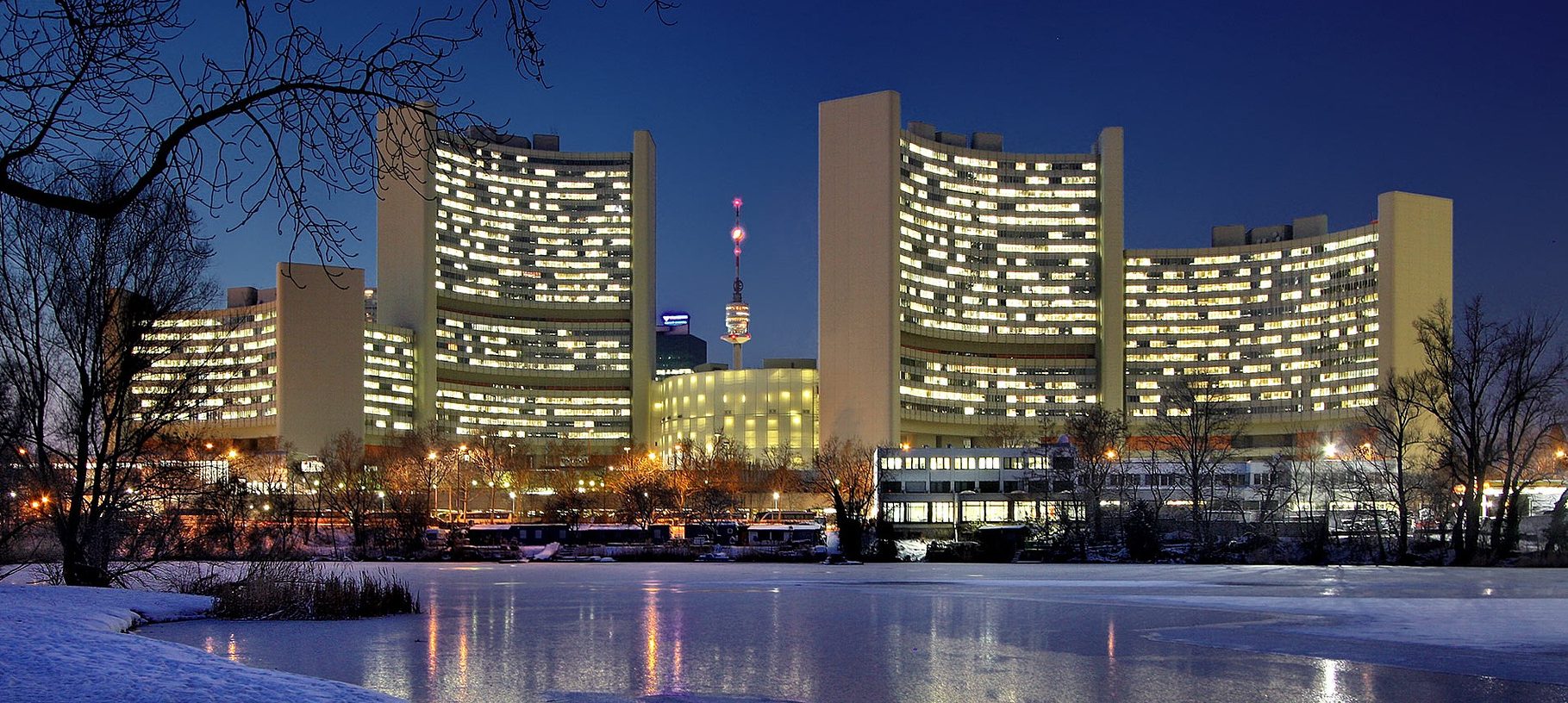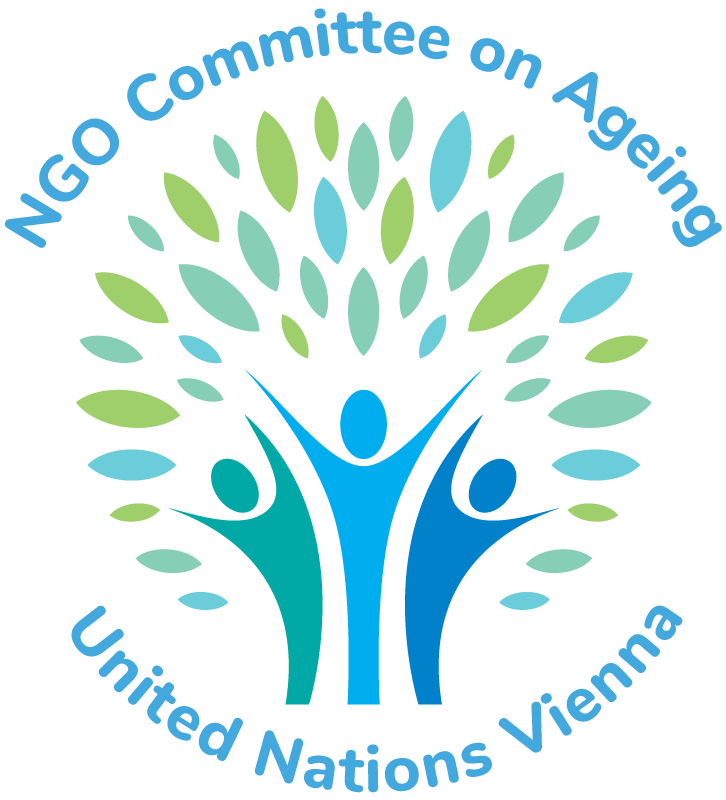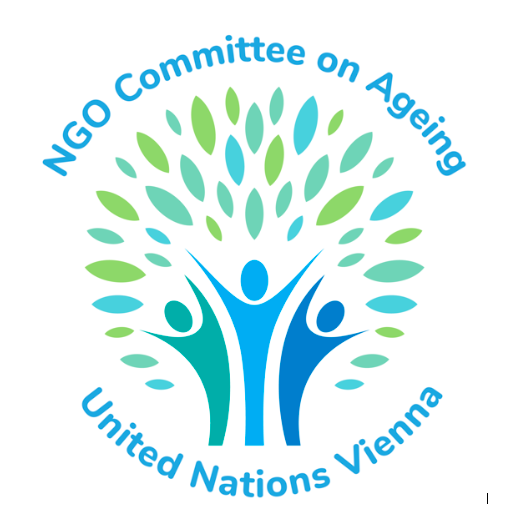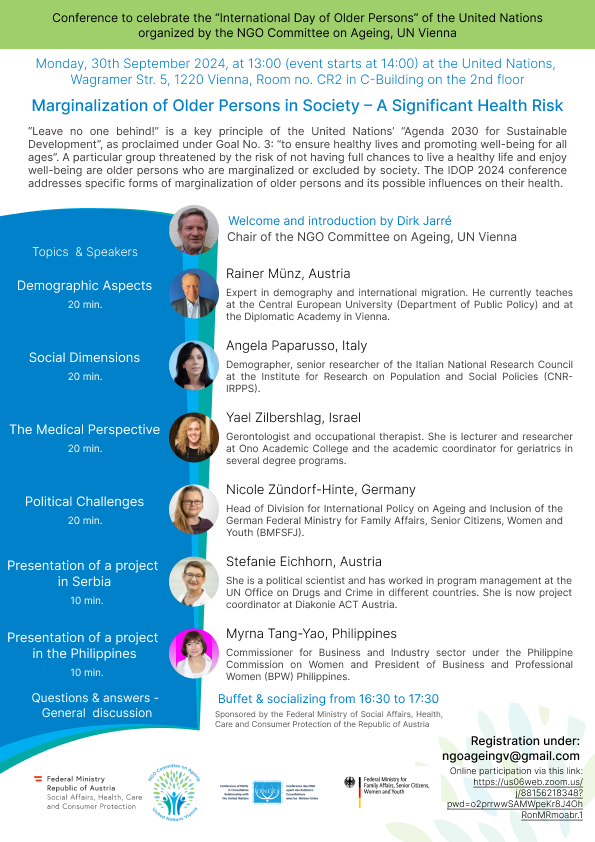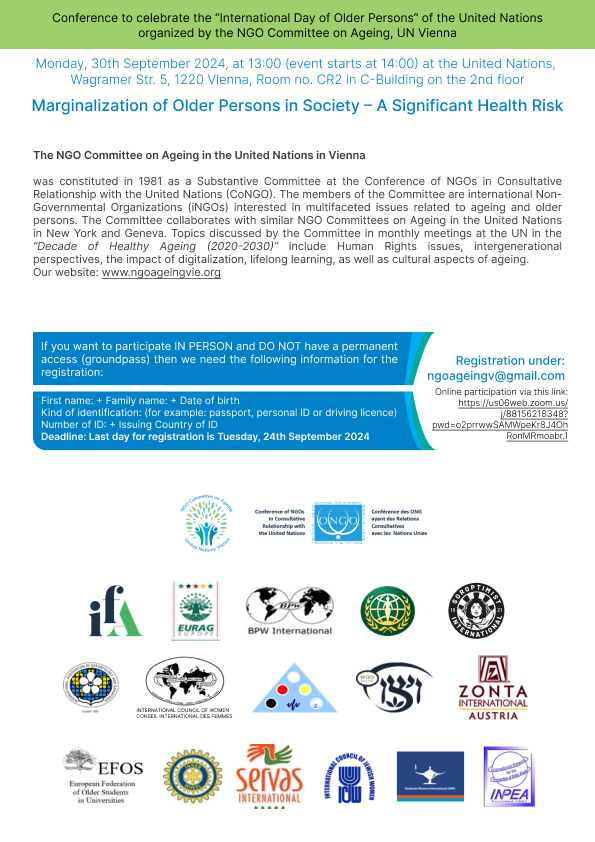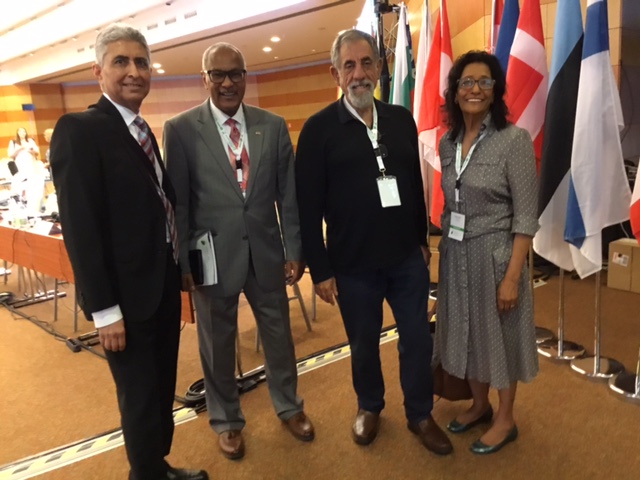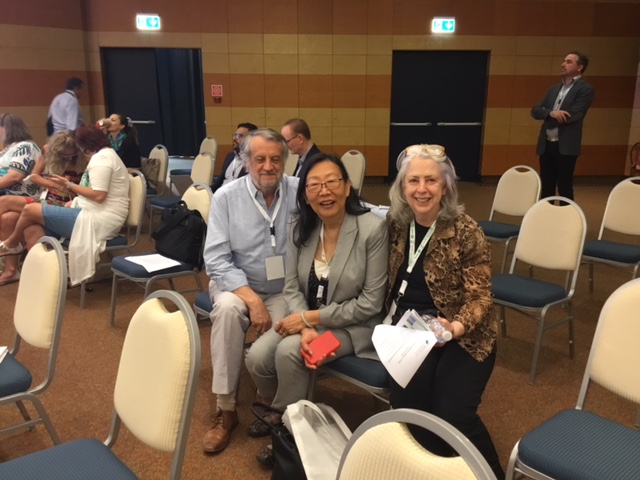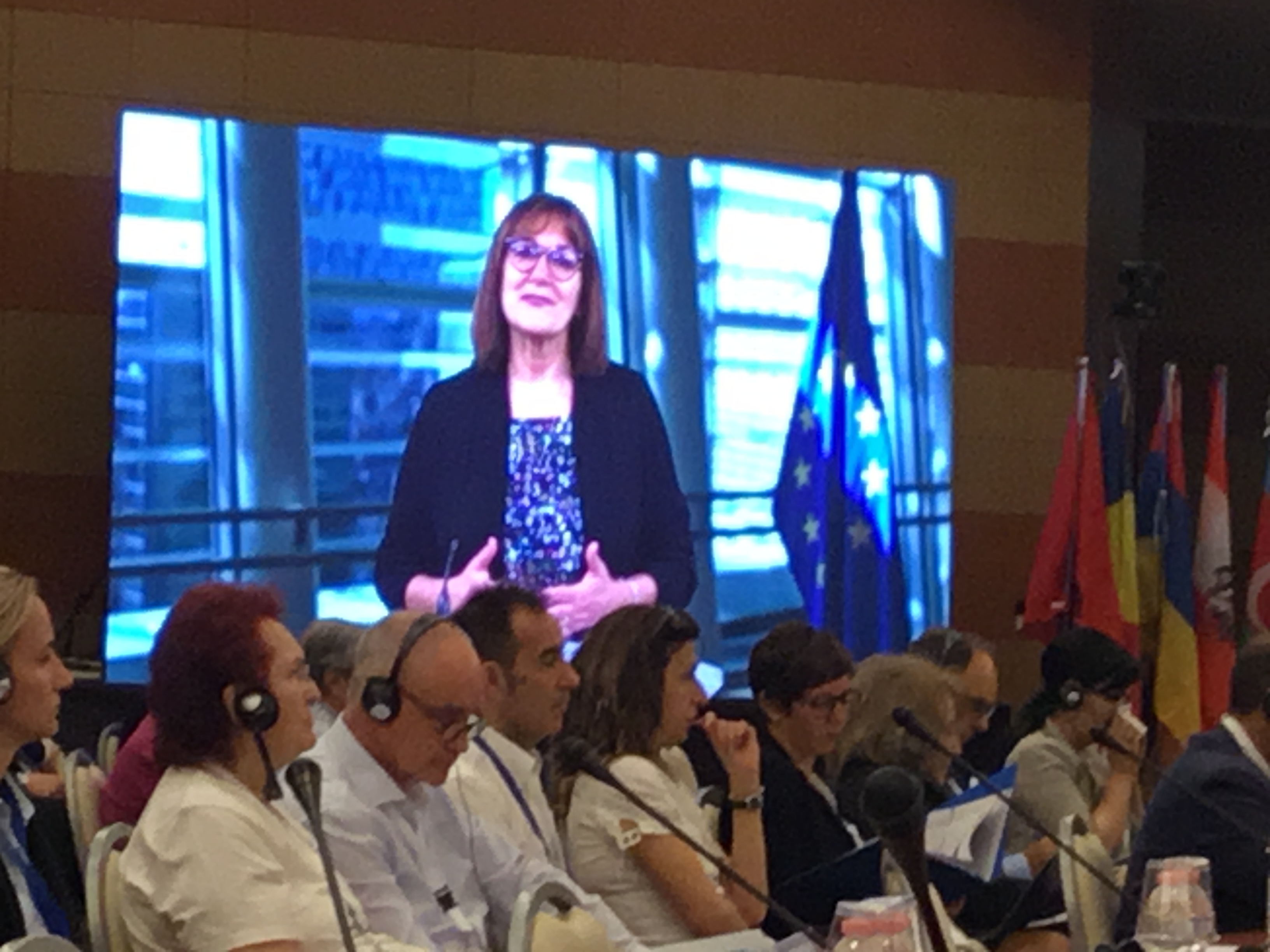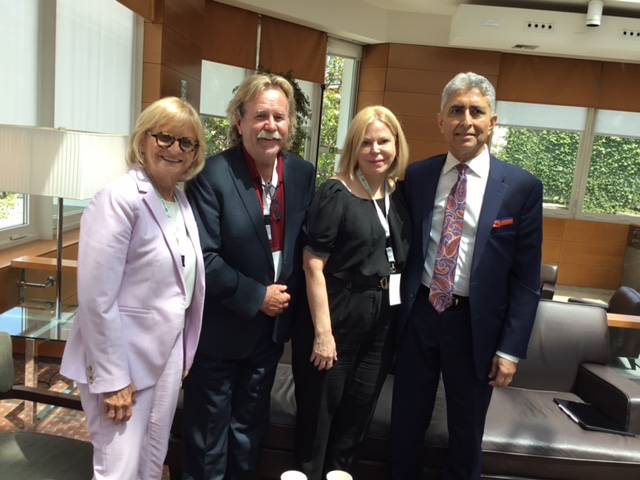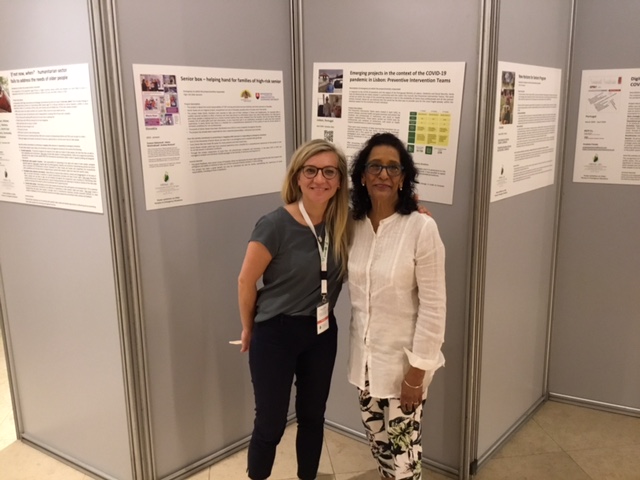NGO Committee on Ageing
United Nations ViennaThe Vienna NGO Committee on Ageing is a Substantive Committee at the Conference of NGOs in Consultative Relationship with the United Nations (CoNGO). It is comprised of Non-Governmental Organisations (NGOs) who address questions related to ageing and older persons.
The Committee advocates on behalf of older persons’ rights before the UN Commissions, promotes further integration of ageing issues into UN policies and programmes and encourages Member States to include ageing needs and rights in their policies.
Mission Statement Committee on Ageing
The members of the NGO Committee on Ageing at the United Nations Office in Vienna, Austria, are committed to sustain and enhance safety, security and wellbeing of older people and empower them to participate as change agents in intergovernmental fora dealing with social, economic, and human rights issues. Our aim is to move beyond ‘knowing’, to ‘speaking out and doing’ in order to eliminate the biases towards older people in communities and society at large.We aspire to courageously advocate for older people and to monitor and increase their inclusion in and contribution to various spheres of public life. The NGO Committee on Ageing in Vienna works closely with the representative of the Austrian Social Ministry to promote the integration of the rights of older people into an international legally binding instrument.
Click here to read the full mission statement
Executive Board
Election Period 01/2024 – 01/2026
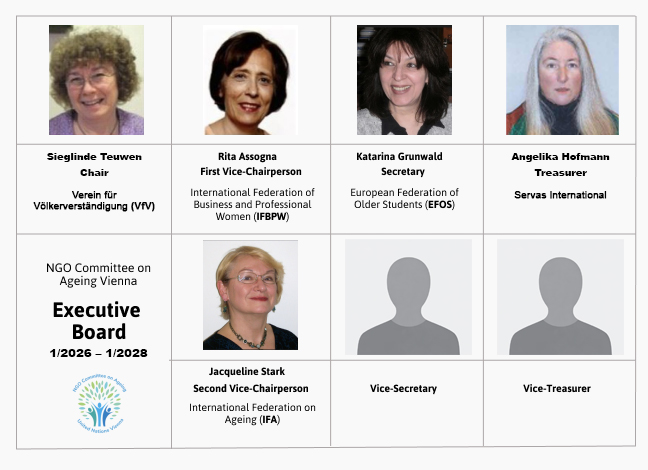
IDOP 2025
The NGO Committee on Ageing, Vienna is proud to announce two events honoring the UN International Day of Older Persons 2025. The first event will be held on September 26th in the United Nations in Vienna (English). The second event will be held in German in the House of the European Union in Vienna on September 29th. Please join us in person or online.
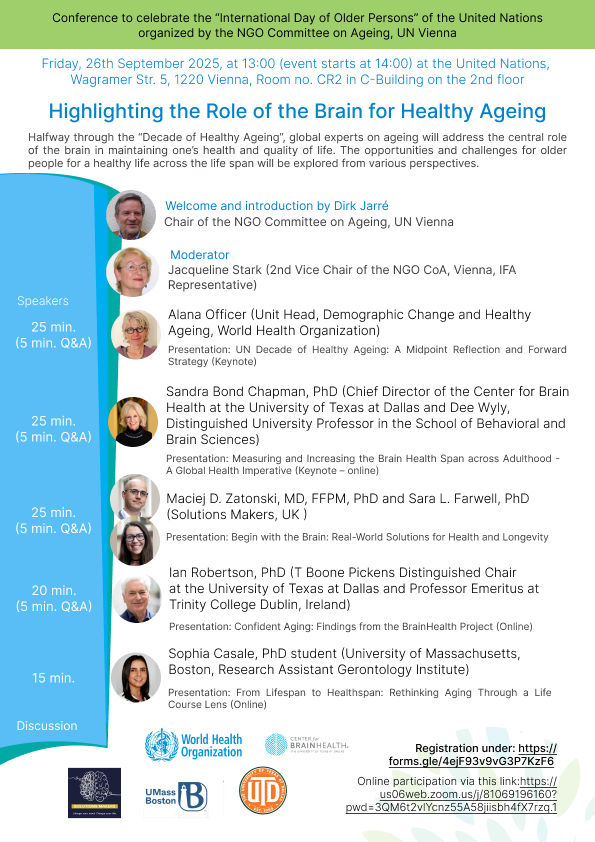
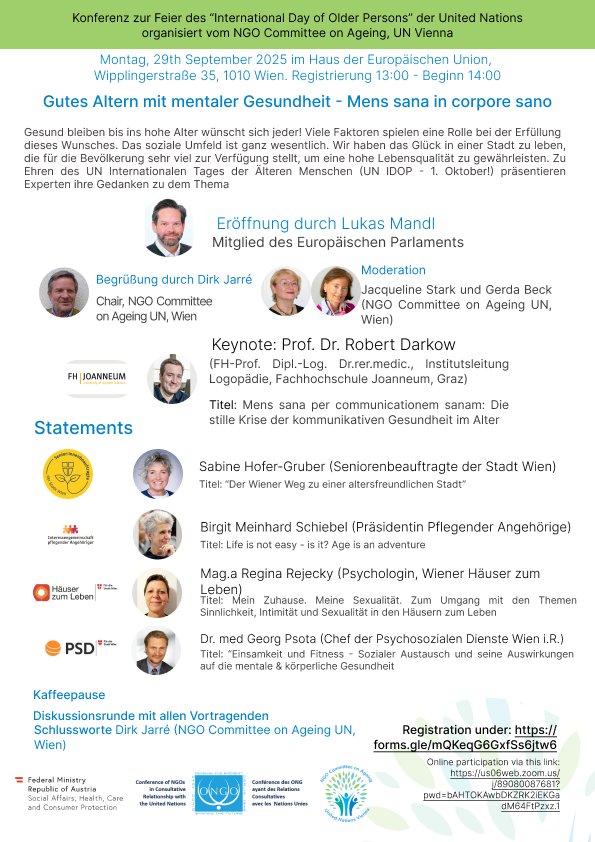
Historic UN Resolution Advances
Human Rights of Older Persons
On April 3, 2025, the United Nations Human Rights Council adopted a landmark resolution, establishing a new intergovernmental working group to draft an international legally binding instrument (UN convention) on the human rights of older persons. This resolution highlights a global commitment to promote and protect the human rights of older persons.
Historical moment: After the UN General Assembly concluded the work of the Open-Ended Working Group on Ageing, which throughout 14 years of work highlighted substantial gaps in the protection of older persons‘ rights, the Human Rights Council mandate to draft a legally binding instrument. The resolution adopted at the HRC58 today, driven by a core group of nations including Argentina, Brazil, The Gambia, the Philippines, and Slovenia, received very strong support from sixty-eight cosponsoring countries, including thirty-three members of the Human Rights Council.
Today’s resolution not only paves the way for a new convention but also sets an historical milestone in the promotions of older persons‘ human rights worldwide.
Significant Contribution of NGOs: The Global Alliance for the Rights of Older Persons and the NGO Committee on Ageing in Geneva ably organised and coordinated the advocacy at the 58th session of the HRC. Many organisations such as Age International, AARP, Age Platform Europe, BAGSO, the International Federation on Ageing, HelpAge International, The International Network for the Prevention of Elder Abuse, The International Longevity Centre Global Alliance, Soroptimist International and many others were present in Geneva in person and online. NGOs have been instrumental in advocating for a Convention and the drafting of this resolution. Their relentless efforts, including delivering multiple statements, hosting a side event and participating in the informal negotiations, have been key in mobilizing support, raising awareness, and influencing discussions at the UN.
Impact of the Adopted Resolution and future Convention: The newly adopted resolution establishes a working group that will negotiate and draft, a legally binding instrument enshrining older persons’ rights into international law.
Next Steps: With the resolution now in place, the focus shifts to the consultation and drafting under the continued guidance and contribution of the Core Group of the resolution, the Office of the High Commissioner for Human Rights and the Independent Expert on the enjoyment of all human rights by older persons. Civil society organizations will meaningfully engage and play a crucial role in this process providing expertise and advocacy. This historic development will influence parallel and future international discussions, including the UN Decade of Healthy Ageing and the upcoming Social Summit in Qatar, shaping broader human rights and social policy frameworks.
Report by: Alejandro Bonilla Garcia, Chair NGO Committee on Ageing (Geneva), Representative to the United Nations in Geneva of the International Federation on Ageing
Conference 2024 to celebrate the
“International Day of Older Persons” of the United Nations
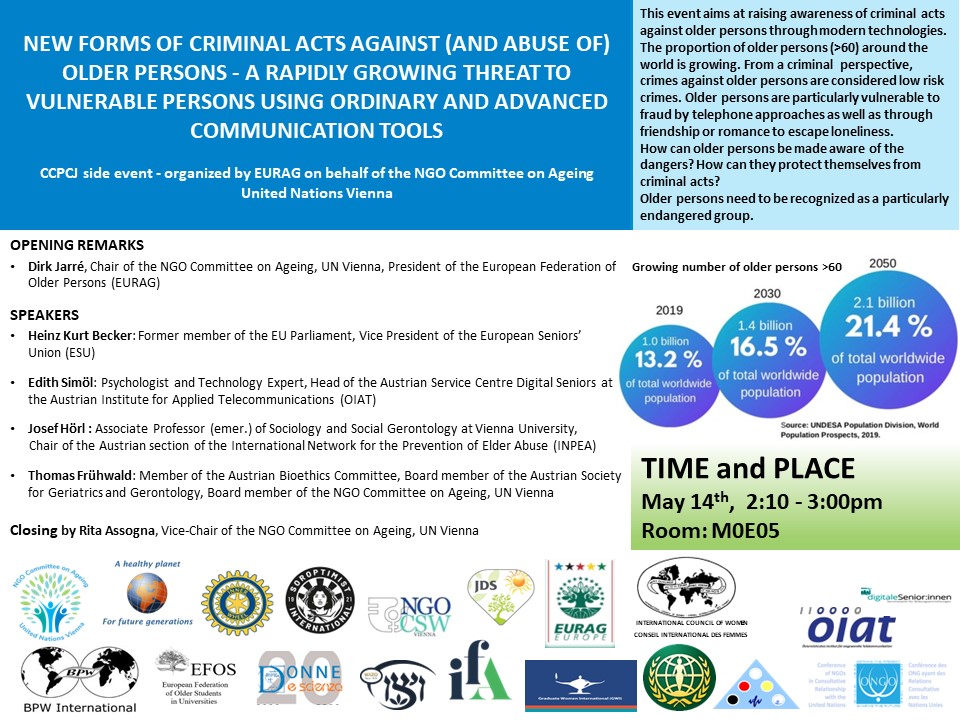
Multi stake holders meeting on Human rights of older persons, UN Geneva August, 29-30, 2022
Upon initiative of Ambassador Villegas, Argentinian chair of the council, in cooperation with other stake holders, the council of Human Rights in Geneva held a two days discussion about Human Rights of Older Persons. Panelists were NGOs, experts and UN officers. Ambassadors and other state representatives, civil society and NGOs delivered their statements from the floor.
Michele Bachelet, who is finishing her term as high commissioner of human rights, delivered her personal greetings.
Ambassador Villegas, who has a long-lasting human rights expertise, pointed out that defining human rights of older persons gained urgency during epidemics. Women, in particular older women, older people in general and children suffered most. Claudia Maler, Austrian independent expert of UN, pointed out that although many statements handling the rights of older persons were received in the past, a legal binding definition in a single document was not drafted yet. Speakers from around the globe commented from the floor and described the position of the countries.
Ageism in health services, denial of access to education and other violations of the rights of older persons were discussed. Violations of the rights of older persons are often interdisciplinary, and not included in the reported numbers. It should be recognized that older persons are not beneficiaries but human rights holders and that investment in aging is an investment in the future and not an expenditure. Collecting of data on violations and on expenditure should be undertaken. Regional treaties and /or working groups were formed in Latin America, and other regions. It was called for forming of a global body, that will draft a single document, reviewing the rights of older persons.
It was suggested that governments should be obliged by a convention to outreach to NGOs for implementation.
A report by Prim. Dr. Hava Bugajer-Gleitman.
Chair’s Report of the UNECE-MIPPA 15-17 June 2022 Ministerial Meeting in Rome
The UNECE Ministerial Conference on Ageing 2022 took place in Rome from 16-17 June. The conference ‘s aim was to complete the fourth review and appraisal cycle (2018-2022) and mark the 20th anniversary of the adoption of the Madrid International Plan of Action on Ageing and its Regional Implementation Strategy. The theme of the conference was
“joining forces for solidarity and equal opportunities throughout life”.
The objective of this conference was, as emphasized by Elena Bonetti, the Italian Minister for equal opportunities and family, to determine “the policy and action priorities for the next five years”.
There were 43 delegations from UNECE member states, one delegation with observer status, and international organisations (WHO, UNFPA, Council of Europe, European Commission, OECE, UN, plus representatives of civil society and scientific research).
On the day before the official conference began, there was, on the 15th of June, a joint Forum of Civil Society and Scientific Research entitled “A fulfilling life throughout the life course – a joint effort of civil society and research in policy making”. At the end of the day a Declaration of the Joint Forum on Civil Society and Scientific Research was proposed. The main demand was:
“…we deem it necessary to create without delay an international, legally binding instrument to substantiate the policy efforts made by member States on the promotion and protection of older person’s rights”. Therefore, we call on governments to support the drafting of a UN Convention for the rights of older persons to guarantee the equal application of universal rights in older age at national and global levels”.
In one of the conference documents, it was noted that since the 2002 Madrid conference the percentage old people (65+) has risen from 13.4 per cent to 17.5 percent in the ECE region. If present trends continue, by 2030 people aged 65 and older are set to account for 20 percent of the total population in the European Community region. This increase will, inter alia, require many more carers than and resources that are presently available.
On the first official conference day, our CoA member Alexandre Sidorenko was keynote speaker, addressing the topic “Priorities for aging policies in the UNECE Region”. His presentation will be on our website.
There were a number of expert panels, including one on “Promoting active and healthy ageing throughout life”. One of the speaker was the Canadian Kiran Rabheru, the chairman of the steering group of the Global Alliance for the Rights of Older People (GAROP). We hope to have his speech on our website soon.
Mr. Stecy Yghemonos, Director of Eurocarers, spoke movingly about the plight of caring within the family whereby the main responsibility usually falls on woman. The Eurocarer’s Association has set up many support groups within carers groups with an emphasis on intergenerational involvement.
There were a number of side events, including one organised by the Austrian Ministry of Social Affairs, titled “Toward age-responsive crisis management: what we have learned from the COVID pandemic”. It was chaired by Johannes Rauch, the Austrian minister of Social Affairs. He has been invited to be our keynote speaker on the UN-IDOP event whose main theme this year is. The Resilience and Contributions of Older Women. He has been asked to address as keynote speaker Austria’s policies with regard to the general topic of this year’s International Day of Older People.
One side event on the 17th of June addressed the issue of “Combating Elder Abuse: What’s Next? Five priorities for the Decade”. It was organized by INPEA. It was mentioned that according to WHO estimates, 1 in 6 people over 60 years of age suffers from abuse. That means nearly 141 million people globally. This number may be much higher as neglect, abuse and violence against older people are among the most hidden and underrepresented violations of human rights. Alexandre Sidorenko, moderated the event.
On the final conference day, there was a Roundtable discussion of ministers and heads of delegation. Its rapporteur: Amal Abou Rafeh (Chief of the Programme on Ageing Section, United Nations ) summarized the main conclusions. These were also reflected at the end in the Ministerial Declaration which was endorsed by the ministers present. It covered important issues like:
- Promoting active and healthy ageing throughout life
- Ensuring access to long-term care and support for carers and families
- Mainstreaming ageing to advance a society for all ages.
Finally, the meeting entrusted a Standing Working Group on Ageing with the task of updating the regulation impact statement of MIPAA and exploring the possibility of updating MIPAA to adopt ageing-related policy responses to economic, social, and digital transitions and emerging challenges, and developing further instruments to support them.
The conference provided an opportunity to meet face-to-face colleagues and friends I had not seen in a long time. It was good to experience the feeling that we were all working for a common objective, namely to enhance and strengthen older persons’ role and contribution in society. This is fully in line with our mission statement which stresses the importance of moving beyond ‘knowing’ to ‘speaking out and doing’ in order to eliminate the biases towards older people in com munities and society at large.
Find out more about the talks and posters of the conference in this booklet or directly on MIPAA’s website: https://mipaa20rome.it
WSIS Forum 2022
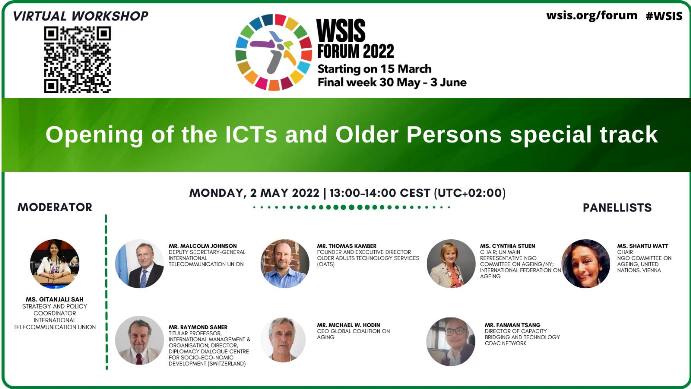
The NGO CoA Vienna supports EURAG’s statements regarding the Situation of Older Persons in the Ukraine and their anti-war declaration! Stop the war and the genocide in Ukraine before it spreads across the entire Europe and the world!
We hold that war is the biggest crime against humankind in which no law can secure the rights anymore. War is the worst human-made disaster undermining the foundations of the international security system while humanity stands witness to the wars’ catastrophic impact. War crimes, genocide of the population and devastation of private and public wealth remain unpunished despite the fact that they make human development regress by a century or more.
At the EURAG’s regular session held on the 8th of March 2022 representatives of the EURAG members, national organisations of and for older people unanimously supported the decision that EURAG should make this anti-war declaration calling for the United Nations to send security forces to Ukraine as to protect the population, cease their sufferings, prevent the genocide and terminate the war there before it spreads to other European countries and the world. This declaration calls on the European Parliament, the European Commission, the UN Security Council and other international organisations to take measures and action immediately to extinguish the fire of war now that it might still possible.
Our members belong to generations who survived the Second World War or were born immediately after the war, generations who know well how a dictator’s will may grow and become immensely destructive unless international organisations stop him immediately. Therefore, on behalf of all its members, national organisations of older people EURAG, call on the United Nations Security Council, the European Parliament, the European Commission, the Council of Europe and other international organisations not to underestimate the experience and wisdom of its members and use it for the benefit of all generations.
A leader whose mind is captured by his political fantasies and who entirely disrespects international state law and principles of humanity will not abandon his further European territorial demands unless an external pressure is put on him. The UN is the most powerful and sole world organisation meant for safeguarding the international peace, progress and peaceful co-habitation among people of all nations. Therefore, we trust that you will terminate the war in Ukraine. We trust that you will put an end to this genocide war before President Putin goes on enslaving Europe. We strongly reject the possibility of war between President Putin and the NATO.
The aggression on Ukraine is leading to huge civil human casualties and massive material destruction, so European member states are attentive mostly to the effects of this war: refugees in need of help though an immediate attention has to be given not to the consequences but, on the contrary, to the causes of this human catastrophe, i.e. occupation and war. We trust you will demand the retreat of the Russian army. Then only international organisations and humanitarian NGOs will be able to help, and people will be able to go back to their country.
We urge you to act quickly to stop this unjust and utterly meaningless war
On behalf of the EURAG member organisations and individuals from 29 European countries and Israel Date: 12.3.2022
Dirk Jarré- EURAG president
Dana Steinova-EURAG Secretary General
www.eurag-europe.net

OEWGA
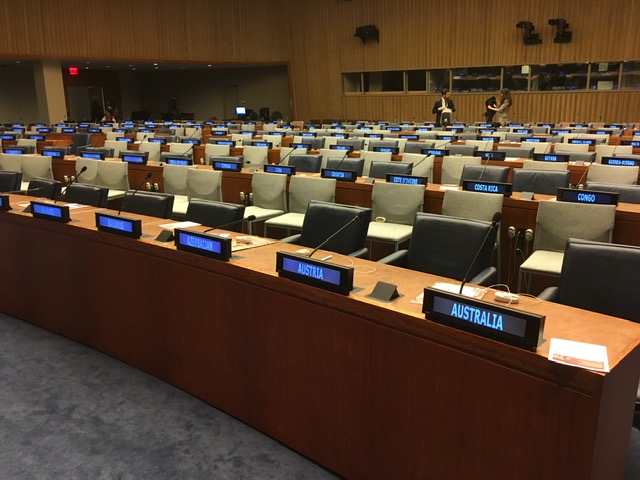
On behalf of the NGO Committee on Ageing at the United Nations Vienna, the Board and all the member organisations of this committee would like to express their deep commitment and solidarity with older persons in our society all around the world during this worldwide health crisis. We hope that all generations will come together and support each other in significant ways to lessen the burden of those at risk. We highly commend all those involved in the health professions and official and private agencies who are risking their own lives to save lives. We cannot thank you enough!
NGO Committee on Ageing at the United Nations Vienna
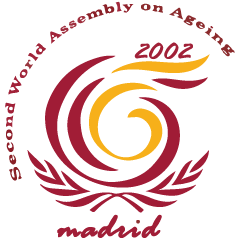
Celebrating 20 Years Madrid International Plan of Action on Ageing (MIPAA):
Link to UN DESA
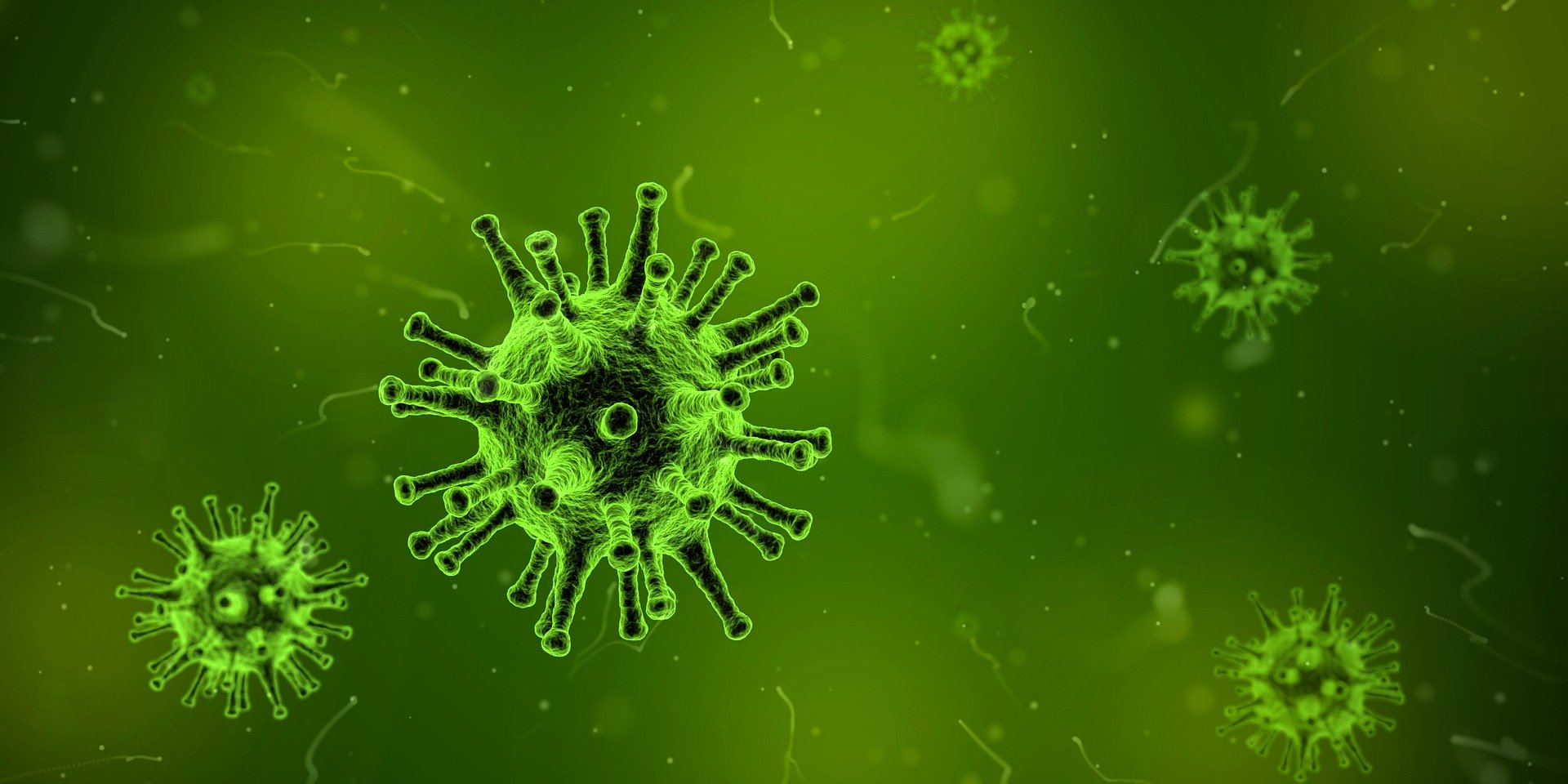
COVID-19:
UN Launches Global Humanitarian Response Plan
